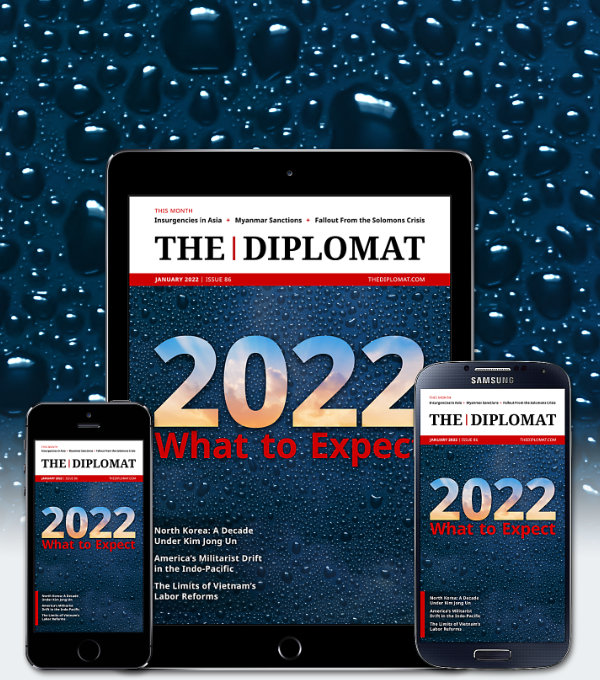| Welcome to the latest issue of Diplomat Brief. This week our top story focuses on forced labor in China’s prisons. We also have an interview with Trey McArver, partner at Trivium China in Beijing, about how China’s elite politics will intersect with foreign policy in 2022. |
| Story of the week |  | SOCIETY Forced Prison Labor in China: Hiding in Plain SightWhat Happened: In late 2019, a 6-year-old in the U.K. discovered a disturbing note written inside a Christmas card, part of a sealed pack purchased by her family for the holidays. The note read: “We are foreign prisoners in Shanghai Qingpu prison China. Forced to work against our will. Please help and notify human rights organization.” The discovery sparked a media furor in the U.K. and, inside Qingpu prison, a frantic cover-up that involved enticing inmates to take part in elaborately staged interviews. Peter Humphrey, a long-time China hand, revisits the 2019 case based on interviews with newly-released inmates from Qingpu. Humphrey has a personal connection to the story: He was formerly incarcerated in Qingpu prison as well and was specifically named in the Christmas card note as a person to contact on behalf of the prisoners. Our Focus: Humphrey’s interviews explain the efforts behind the cover-up. After the Christmas card note was discovered, prison officials went into overdrive to try to refute the accusation of forced labor. They recruited two prisoners to take part in scripted interviews and staged activities. “On Christmas Day they sent Chinese TV to the prison to do a cover-up and to show how wonderful our life was in there,” said Romeo Papava, an import-export trader who served a four-and-a-half year sentence in Qingpu for an alleged theft. “Two prisoners … were put in front of the cameras to lie. They said exactly what they were told to say.” But behind the scenes, the ugly practice of forced labor continues to this day. What Comes Next: The question of forced labor in China has gained new relevance over accusations that Uyghurs are being forced to work in factories after being released from internment camps. But, as Humphrey notes, this issue must be viewed against a broader backdrop: “[T]he practice is not unique to the Uyghurs. Forced labor is in fact pervasive throughout the entire Chinese prison system, and is present in all Chinese incarceration facilities, which hold many millions of prisoners.” And intriguingly, Humphrey’s interviews suggest that public opinion and global pressure may have more impact on China than often assumed. The prisoners noted the forced labor stopped, if only temporarily, after the story broke, while global media attention was laser-focused on Qingpu prison. Read this story |
| Behind the News | INTERVIEW Trey McArverTrey McArver, partner at Trivium China in Beijing, on the foreign policy implications of China’s 20th Party Congress: “Xi believes that China should be more assertive on the world stage. His consolidation of power at home has already allowed him to promote a more forceful and proactive foreign policy than his predecessors. Should Xi further consolidate power at the 20th Party Congress, we will see an intensification of this trend in the years to come.” Read the interview |
| This Week in Asia | Northeast Asia Hong Kong, Hamsters, and COVID-19Hong Kong made news this week for a controversial plan to mass-euthanize hamsters after discovering an outbreak among a pet store. Besides outraging animal lovers, Hong Kong’s hamster quest points to a deeper problem in the government’s approach. An obsession with reaching “zero COVID” is keeping Hong Kong from taking more practical steps that would ultimately be more effective in helping its people weather the pandemic. Find out more | South Asia Lahore Attack Part of Worrying Terror Wave in PakistanA blast in a bustling market in Lahore in Pakistan’s Punjab province on January 20 killed at least three people and injured over 30 others. The attack, claimed by Baloch militants, was the latest in a worrying uptick in terror attacks in Pakistan – particularly since the Taliban reclaimed power in neighboring Afghanistan. The Taliban’s victory has given confidence to several extremist groups in Pakistan, and as a result Pakistan’s government estimates that terror attack are up around 35 percent since the Taliban captured Kabul. Find out more | Southeast Asia A Year Since Myanmar’s CoupFebruary 1 marks the anniversary of the military takeover in Myanmar, which plunged the country into a crisis with no apparent end. A year on, the military junta has failed to consolidate its control, and is struggling to bring the continued – indeed, rising – armed resistance to heel. As Myanmar’s economy continues to deteriorate, with Western firms heading for the exits, and army offensives continuing to generate flows of displaced civilians, diplomatic initiatives aimed at ending the crisis are at an impasse. All this points to another turbulent year to come. Find out more | Central Asia No Power: Blackouts Strike Central AsiaVast swaths of southern Kazakhstan, Kyrgyzstan, and Uzbekistan were hit with a massive blackout this week. The precise cause isn't known yet, but arguably sits at the confluence of decrepit infrastructure, delayed modernization efforts, increased demand, and climate change – all factors that routinely cause blackouts across the region. Authorities may scapegoat cryptomining in Kazakhstan, but the problems are much deeper. Find out more |
| Visualizing APAC |  | Photo by Umer Ahmad for The Diplomat. The fossil rocks of Guryul Ravine in Kashmir have made the site an exploration destination for geologists since 1859. See the full picture |
| Word of the Week | POLITICS ตาสว่างTa sawang, Thai for “cleared eyes” or “brightened eyes,” it refers to a political awakening among Thailand’s people. The phrase comes from the title of a graphic novel released in 2020. Find out more |
|  |




